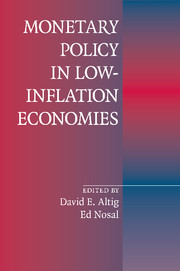Book contents
- Frontmatter
- Contents
- Contributors
- Acknowledgments
- Introduction
- 1 The Welfare Cost of Inflation in the Presence of Inside Money
- Commentary
- 2 An Open-Economy Model of Endogenous Price Flexibility
- Commentary
- 3 Efficient Inflation Targets for Distorted Dynamic Economies
- Commentary
- 4 Inflation and Welfare in Models with Trading Frictions
- Commentary
- 5 Good versus Bad Deflation: Lessons from the Gold Standard Era
- Commentary
- 6 Monetary Policy Orientation in Times of Low Inflation
- Commentary
- 7 Observations on Disinflation in Transition Economies
- Commentary
- 8 Inflation and Financial Market Performance: What Have We Learned in the Last Ten Years?
- Commentary
- Index
Commentary
Published online by Cambridge University Press: 26 January 2010
- Frontmatter
- Contents
- Contributors
- Acknowledgments
- Introduction
- 1 The Welfare Cost of Inflation in the Presence of Inside Money
- Commentary
- 2 An Open-Economy Model of Endogenous Price Flexibility
- Commentary
- 3 Efficient Inflation Targets for Distorted Dynamic Economies
- Commentary
- 4 Inflation and Welfare in Models with Trading Frictions
- Commentary
- 5 Good versus Bad Deflation: Lessons from the Gold Standard Era
- Commentary
- 6 Monetary Policy Orientation in Times of Low Inflation
- Commentary
- 7 Observations on Disinflation in Transition Economies
- Commentary
- 8 Inflation and Financial Market Performance: What Have We Learned in the Last Ten Years?
- Commentary
- Index
Summary
THE CONVENTIONAL WISDOM OUTLINED BY LUCAS
This fascinating paper by Rocheteau and Wright makes a contribution to the welfare cost of inflation literature. The authors use a version of the search-theoretic approach to monetary economics that emphasizes periodically centralized and decentralized markets. The centralized markets do not require the use of money, but agents may wish to hold money in order to facilitate exchange in the decentralized markets. Models in this class are known for highly stylized abstraction and typically emphasize purely theoretical findings. However, in this paper, the authors attempt a quantitative-theoretic assessment of the welfare cost of inflation under alternative price formation mechanisms. That they were able to do anything like this is what makes the paper fascinating.
The authors make progress by following the approach that Robert Lucas used in his 2000 Econometrica article “Inflation and Welfare.” That model was also highly stylized, but Lucas was able to use available data over the past century to calibrate the model's implied money demand. He then computed the welfare cost of inflation armed with the calibrated values for key parameters. Rocheteau and Wright use the same procedure and, in fact, keep the analysis completely comparable to Lucas by using nearly the same data and the same definition of a time period, which is one year.
- Type
- Chapter
- Information
- Monetary Policy in Low-Inflation Economies , pp. 117 - 126Publisher: Cambridge University PressPrint publication year: 2009



